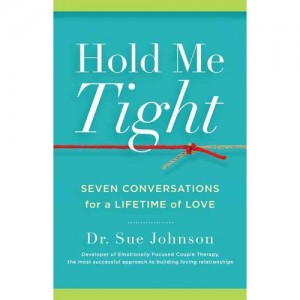Love pulled me in even as I pushed away.

I read this book at the suggestion of someone I have been working with. While I am not sure I buy into the whole EFT (Emotionally Focused Therapy) concept, I do enjoy understanding things. Sue Johnson is a pioneer of EFT which basically took a 180 degree turn from where therapy had historically attempted to derive solutions. Therapist had historically (and many still today) worked to help people understand that they are self-sufficient, believing that once a person was confident in his ability to stand on his own, he could more easily connect and live in peace with others because there would be no pressure put on the other person to meet my needs. EFT, however, seeks to help people understand just how much they do need each other and helps to build solid relationships on the grounds of co-dependence. I am definitely over-simplifying it, but that’s the summary I took away.
Sue shares, as you might have guessed from the subtitle, 7 conversations for a lifetime of love. They are as follows:
- Recognizing Demon Dialogues
- Finding the Raw Spots
- Revisiting a Rocky Moment
- Hold Me Tight – Engaging and Connecting
- Forgiving Injuries
- Bonding Through Sex and Touch
- Keeping Your Love Alive
Thus far, I have found no personal value in this book, but then life is a process. The more I learn and apply, the better life has the potential to be.
A few quotes:
- Love pulled me in even as I pushed away.
- Romantic love was all about attachment and bonding.
- And the trouble is, if you don’t risk anything, your risk is even greater.
- Love has been and remains still a mystical elusive emotion, open to description but defying definition.
- “Behind the mask of indifference is bottomless misery and behind apparent callousness, despair.” – John Bowlby
- Suffering is a given; suffering alone is intolerable.
- Negative relationships undermine our health.
- Women reach out more to others when they feel a lack of connection.
- When marriages fail, it is not increasing conflict that is the cause. It is decreasing affection and emotional responsiveness.
- The demise of marriages begins with a growing absence of responsive intimate interactions. The conflict comes later.
- Nothing brings people together like a common enemy.
- Sadness tells us to slow down and grieve.
- Emotion comes from a Latin word emoter, to move.
- Small moments end up defining out lives.
- Love is the best survival mechanism there is, and to feel suddenly emotionally cut off from a partner, disconnected, is terrifying.
- Loving connection is the only safety nature ever offers us.
- For all of us, the person we love most in the world, the one who can send us soaring joyfully into space, is also the person who can send us crashing back to earth.
- Without feelings as our compass in the territory of close relationships, we are effectively lost.
- There is no true “start” to a circle.
- Attachment relationships are the only ties on Earth where any response is better than none.
- Anger tells us to approach and fight. Shame tells us to withdraw and hide. Fear tells us to flee or freeze, or in real extremes to turn and attack back. Sadness primes us to grieve and let go.
- Everyday hurts are easily dismissed and raw spots can fade away (if we stop rubbing them in Demon Dialogues), but unresolved traumas do not heal.
- What partners need is a special type of healing conversation that fosters not just forgiveness but the willingness to trust again. Renewed trust is the ultimate goal.
- Intentional long-term deception undermines our sense of our partner as familiar and able to be known. As a result, we cannot define our own reality and be sure of what is “true.”
- “We waste time looking for the perfect lover, instead of creating the perfect love.” – Tom Robbins
- Touch arouses, and it also soothes and comforts.
- Monsters don’t stay in boxes. They get out.
- Emotional connection is crucial to healing.
- Loving connection provides the dependable web of intimacy that allows us to cope with life and to live life well.
- Making love work is also accepting that, even when it’s good, it is always a work in progress.
- The idea that one of the best things you can do for your child is to create a loving relationship with your partner is not sentimental, it’s a scientific fact.
- When we love each other well, we help each other parent well.
